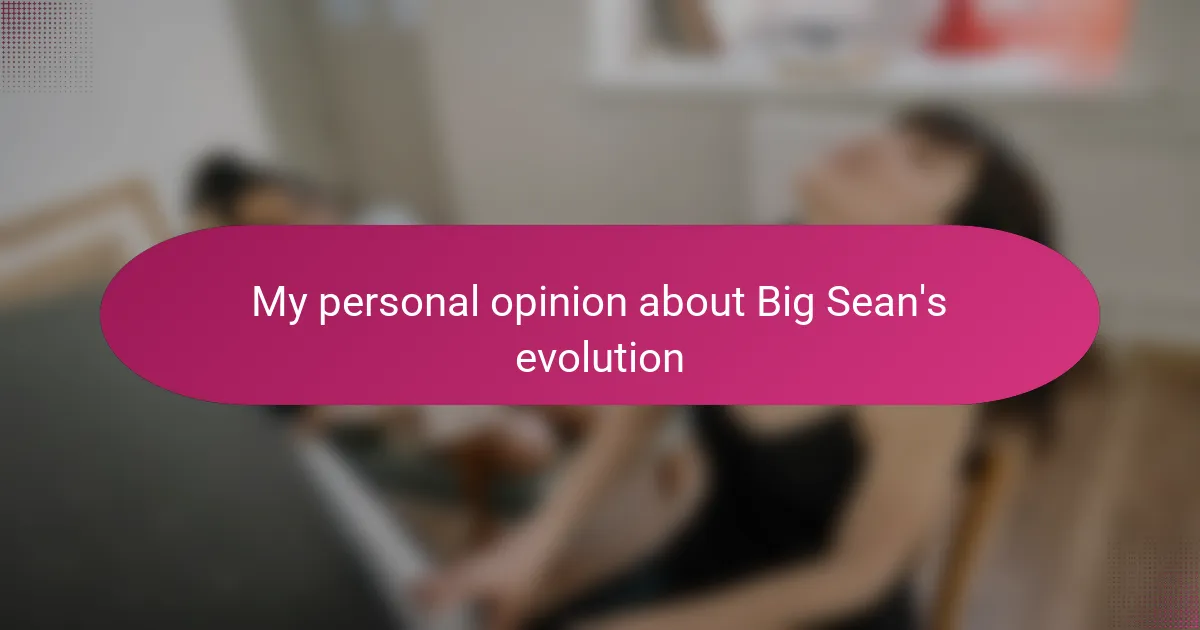Key takeaways
- Big Sean’s rap style blends clever wordplay with a smooth flow, balancing confidence and vulnerability in his lyrics.
- His career milestones reveal a transition from catchy hooks in early work to introspective themes in recent albums like “Detroit 2,” showcasing personal growth.
- Detroit’s hip-hop culture and mentors like Kanye West have significantly influenced his music, contributing to his authenticity and willingness to take creative risks.
- Big Sean’s evolution encourages fans to engage more deeply with his music, fostering a personal connection that transforms the listening experience.
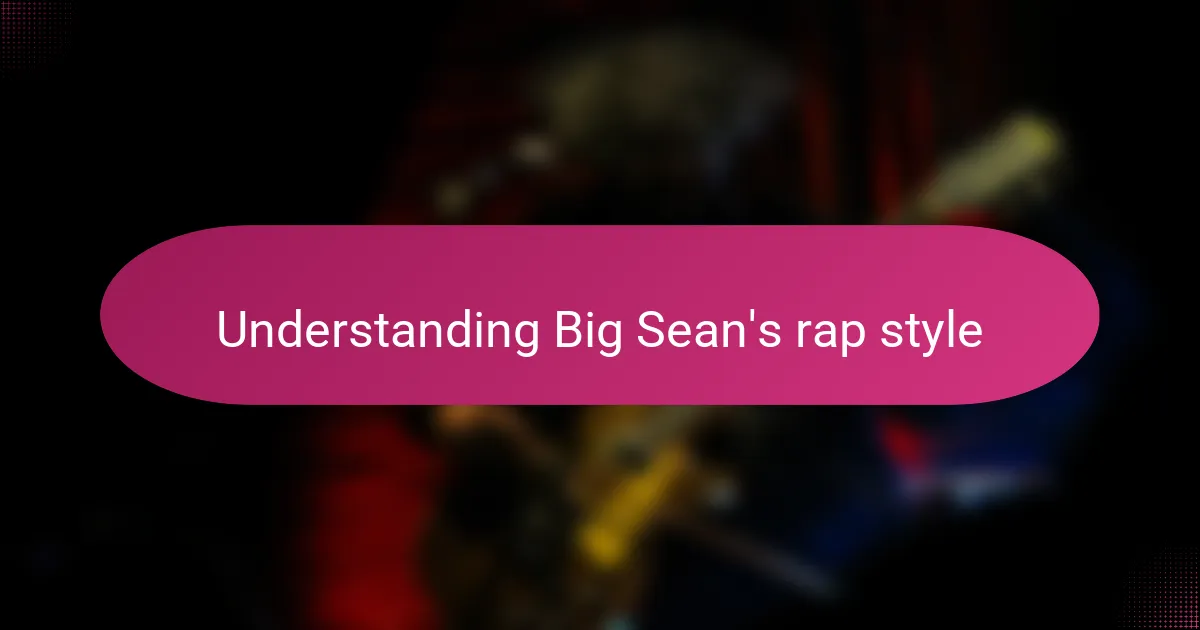
Understanding Big Sean’s rap style
Big Sean’s rap style has always struck me as refreshingly genuine, blending clever wordplay with a smooth, conversational flow. I remember the first time I really paid attention to his lyrics—it felt like he was speaking directly to me, not just rapping for the crowd. Have you ever noticed how effortlessly he turns everyday experiences into punchlines that hit both hard and personal?
What I find fascinating is his knack for balancing confidence and vulnerability. Some rappers lean heavily into bravado, but Big Sean doesn’t shy away from sharing struggles beneath the surface. This honesty adds layers to his style that many artists lack, making his verses resonate deeply with listeners who crave more than just catchy beats.
His flow, too, stands out in today’s rap scene. It’s not overly complicated or flashy, yet it has a distinct rhythm that grabs your attention. From my perspective, this simplicity is part of what makes his style so accessible and enduring—he nails that balance between skillful lyricism and smooth delivery that keeps fans engaged track after track.
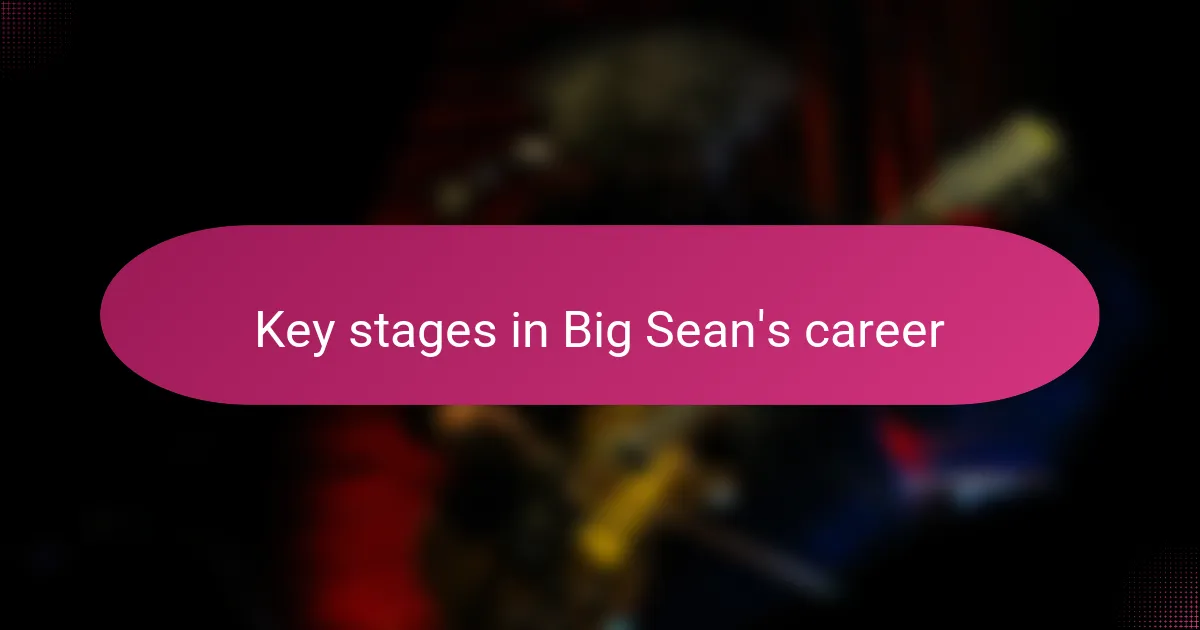
Key stages in Big Sean’s career
Big Sean’s career really took off when he dropped his debut album, Finally Famous, back in 2011. I still recall how that project introduced me to his ability to mix catchy hooks with heartfelt stories. It felt like the moment he stepped out of the background and announced himself as a force to watch in hip-hop.
Then there’s that transitional phase around Hall of Fame and Dark Sky Paradise. I noticed a shift in his music here—a deeper, more reflective tone paired with some of his slickest production. It made me wonder if this was the artist growing not just in skill, but in confidence to explore more personal themes.
Of course, the recent albums show a mature Big Sean who’s comfortable with vulnerability and experimentation. When I listen to Detroit 2, I hear a man reflecting on his roots and his journey in a way that’s honest and almost raw. Doesn’t it make you appreciate how an artist evolves not just technically, but emotionally over time?
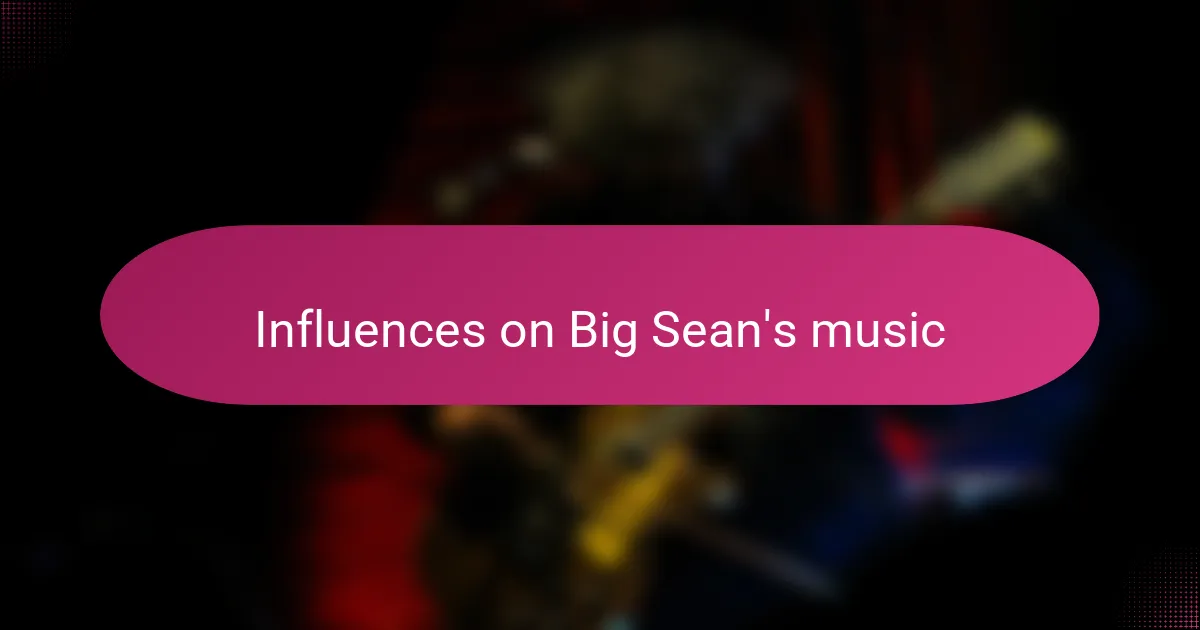
Influences on Big Sean’s music
Big Sean’s music clearly carries the imprint of Detroit’s rich hip-hop culture, and I’ve always felt that connection whenever I listen closely. The grit and soul of his hometown seep into his beats and lyrics, giving his tracks an authenticity that’s hard to fake. Have you ever caught that raw energy that makes you think, “This isn’t just rap, it’s a story from the streets”?
Another influence I can’t overlook is how mentors like Kanye West shaped Big Sean’s sound and confidence. From my experience, working with a producer who pushes boundaries can completely transform an artist’s approach—and you can hear that growth in Sean’s evolving production choices and lyrical experimentation. It makes me wonder how much those collaborations fueled his willingness to take risks without losing his core style.
Lastly, I’ve noticed how personal experiences, from relationships to faith, play a huge role in coloring his music. When Big Sean opens up about struggles or gratitude, it feels like he’s inviting us into his world. That vulnerability isn’t common in all rap, and to me, it’s what sets him apart—it’s like he’s showing us all sides of himself, not just the spotlight persona.
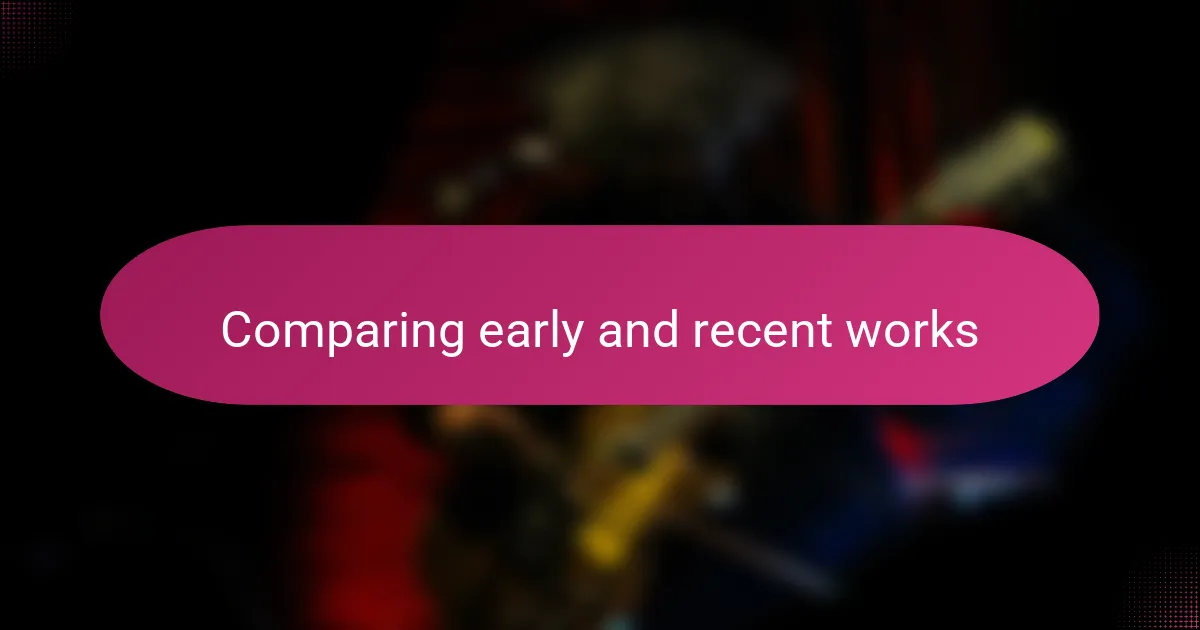
Comparing early and recent works
When I go back to Big Sean’s early tracks like those on Finally Famous, I’m struck by how energetic and playful his bars feel—there’s this youthful confidence that’s both infectious and relatable. Do you remember the way his punchlines used to land with that almost effortless charm? It was the kind of vibe that made you lean in, smiling at his clever twists.
Fast forward to his more recent work, especially on Detroit 2, and the contrast is clear. His lyrics have grown noticeably more introspective, digging into themes like identity and personal growth with a sincerity that hits differently. I can’t help but admire how his flow has become even more refined, trading some of that early brashness for a steadier, more purposeful delivery.
What fascinates me is how seamlessly he bridges these two phases. It’s not like he left behind the charisma of his early days—rather, he’s layered on life’s complexities without losing that core essence. Have you ever experienced an artist evolving without losing their original spark? For me, that balance is rare and makes Big Sean’s journey all the more compelling.
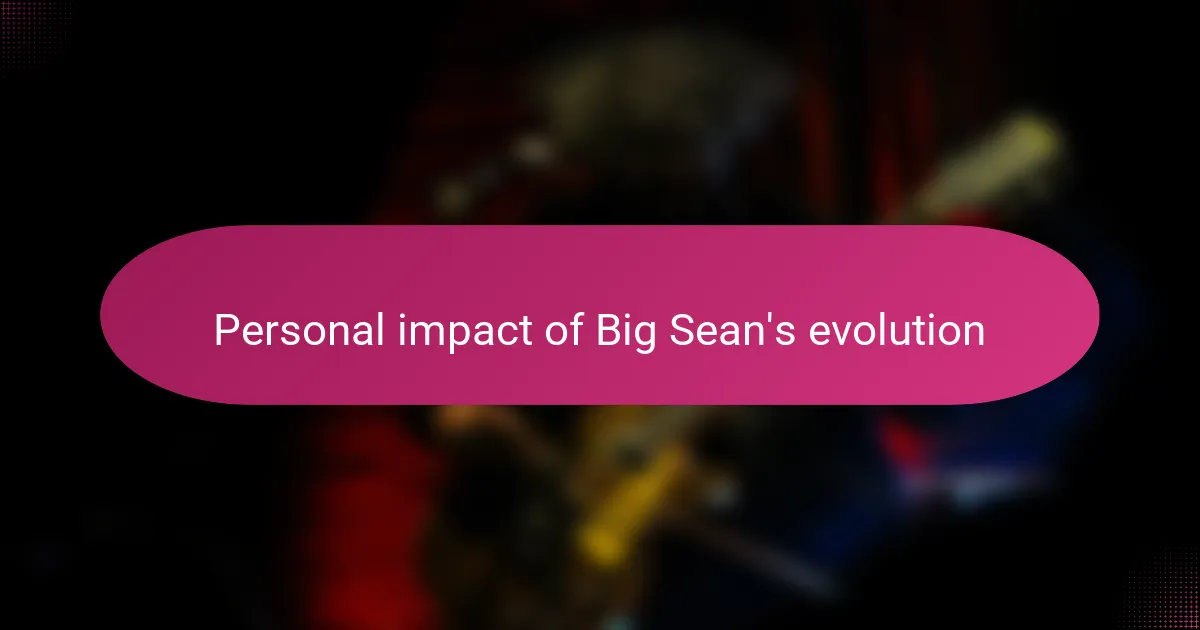
Personal impact of Big Sean’s evolution
I’ve found that Big Sean’s evolution really mirrors some of my own experiences with growth and self-reflection. When his music shifted toward more vulnerability, it felt like he was inviting me into a deeper conversation—not just with his lyrics, but with his whole mindset. Isn’t it refreshing when an artist’s journey connects with your personal ups and downs?
Listening to his later projects, I’ve caught myself pausing to appreciate the raw honesty behind the verses. There’s a moment in Detroit 2 that hit me hard, making me reflect on my own struggles and triumphs. It’s rare for me to feel that kind of emotional bond with a rapper, but Big Sean’s evolution has definitely changed how I experience his music.
At times, I wonder if his growth has also challenged my expectations as a fan. I used to crave just the clever punchlines and catchy hooks, but now I find myself craving that mix of depth and openness. Has anyone else noticed how evolving with an artist reshapes your own taste? For me, Big Sean’s journey has been as much about personal discovery as it has been about enjoying great rap.
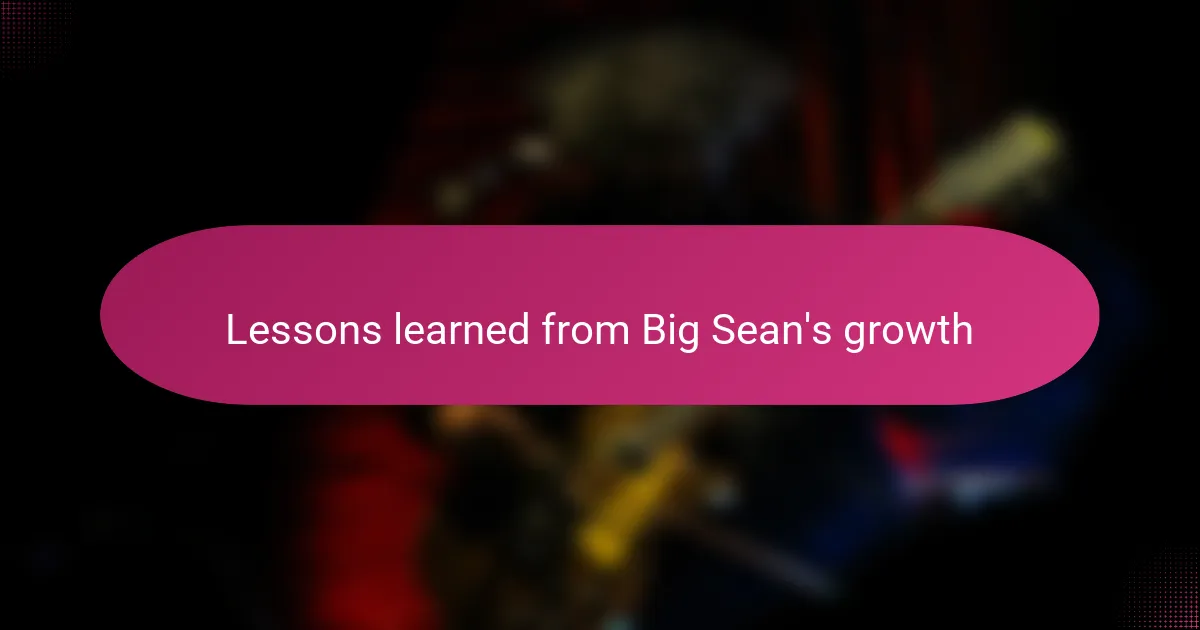
Lessons learned from Big Sean’s growth
One lesson I’ve taken from Big Sean’s growth is the power of embracing change without losing your core identity. Watching him evolve from playful wordsmith to introspective storyteller made me realize that it’s okay—and necessary—to grow in layers, rather than trying to stay stuck in one place. Have you ever noticed how some artists seem to shift so drastically they lose what made them special? Sean manages to keep that spark alive, and to me, that’s a blueprint for longevity in any creative field.
Another thing that stands out is how vulnerability can become a strength. Early on, I thought strong rap meant just flexing and boasting, but Big Sean’s later work taught me that showing your struggles and doubts actually deepens connection. When he opens up about his personal battles, I feel like I’m hearing a friend rather than just an entertainer. Isn’t that kind of honesty what we all crave beneath the surface?
Finally, Big Sean’s evolution reminds me that patience and persistence pay off. Growth isn’t always obvious from one album to the next—sometimes it’s gradual, like threading a needle through thick fabric. I found this reassuring because it echoes my own journey: progress doesn’t have to be flashy or immediate to be real. What’s your take on evolving slowly but surely? From where I stand, that steady climb is where the most meaningful lessons hide.
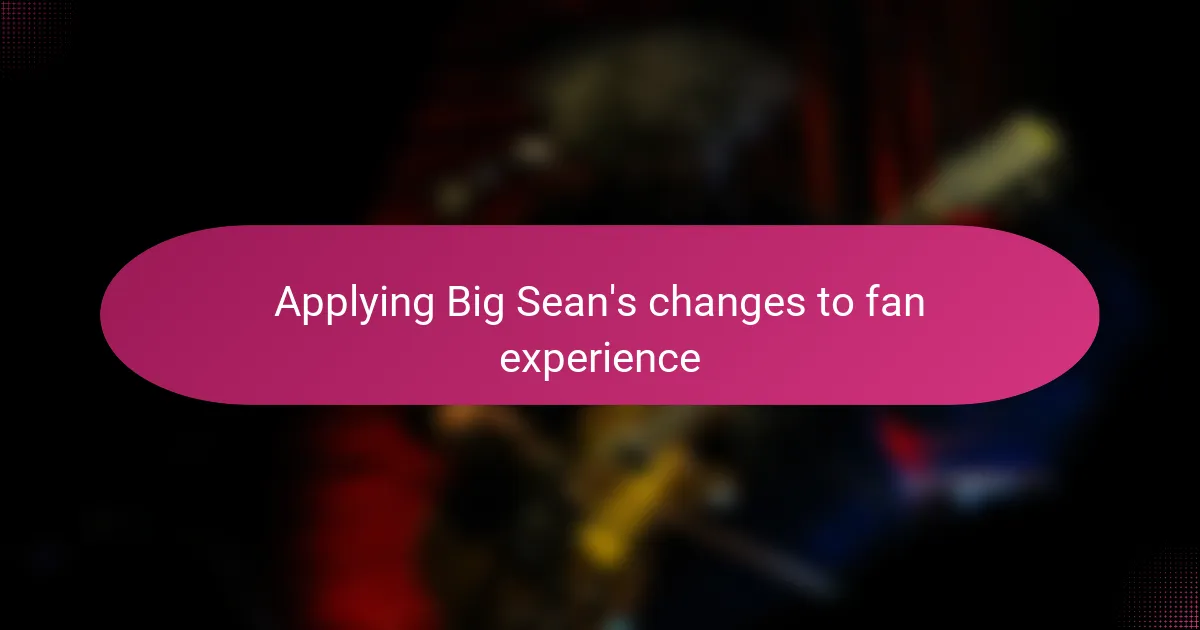
Applying Big Sean’s changes to fan experience
Applying Big Sean’s changes to the fan experience feels like inviting us into a deeper, more personal relationship with his music. When I listen now, it’s not just about nodding along to a beat—I find myself reflecting on his stories and emotions, almost as if I’m sharing moments with an old friend. Have you ever noticed how that shift makes concerts or new releases feel less like performances and more like meaningful exchanges?
From my perspective, these changes push fans to engage beyond surface-level hype. His evolution means that we’re encouraged to pay attention to the layers—the introspection, the vulnerability—which makes being a fan more immersive and rewarding. It’s like unpacking a gift each time, where every lyric and flow development reveals something new about who he is and who we are as listeners.
I also think this transformation reshapes the way fans support him. Instead of just cheering for catchy hooks, there’s a deeper appreciation for his artistic growth and authenticity. Personally, it’s been inspiring to see how Big Sean’s journey invites fans to grow alongside him, making the whole experience feel less about idolizing and more about connecting and evolving together.
